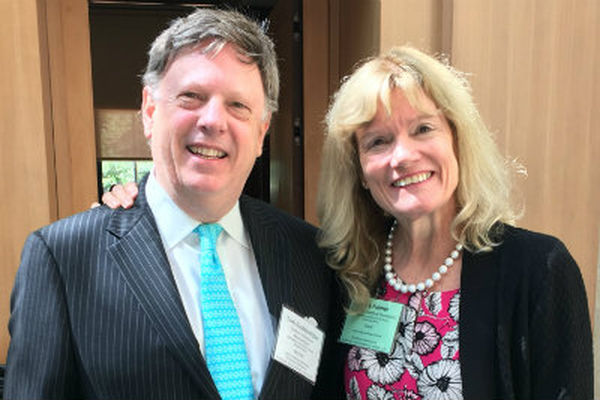John A. Hartford Foundation President Terry Fulmer and I recently participated in the inaugural meeting of the Roundtable on Quality Care for People with Serious Illness, which was held at the National Academies of Sciences Engineering and Medicine (formerly known as the Institute of Medicine).
As I listened to the impressive group of highly knowledgeable and dedicated health care professionals, patients, and caregivers discuss this important topic, I found myself thinking about my mother. She is obsessed with end-of-life planning. Maybe obsessed is too strong a word, but she does talk about it a lot, and she feels strongly about her preferences in the face of serious illness or critical care.
She worries about her priorities not being respected, about receiving care she does not want, and about making her preferences known in advance so that a family proxy can carry out her desires, if necessary. The thought of spending money on unwanted or unproductive care offends her Maine sensibilities.
I should add that she's not at the end of her life. At 71 years old, she's not ill or anywhere near frail. She's a vibrant participant in her church and community, and she's actively helping to raise her grandchildren. She's just scared that she won't be given the autonomy she deserves to make her own choices near the end of her life if she becomes critically ill.
It's a big deal to her. It's a big deal to a lot of us.
That’s why The John A. Hartford Foundation is supporting the Roundtable, which will encompass a three-year effort to follow up the 2014 Institute of Medicine report Dying in America: Improving Quality and Honoring Individual Preferences Near the End of Life with meaningful progress to improve care for people experiencing serious illness and nearing the end of life.
The Roundtable is not focused strictly on care for older adults, but older people are disproportionately represented in the number of Americans with serious illness. The first meeting's objective was to come up with a set of recommended convening activities that the Roundtable will pursue in the coming year to press for improved end-of-life care.
Members of the Roundtable come from a wide range of stakeholder organizations, including health systems and clinicians, insurers, patient and advocacy groups, government, funders, ministries, and academia. They are all participants because they are dedicated to the concepts of person-centered, family-oriented care; clinician-patient communication and advance care planning; professional education and engagement; policy and payment system alignment with person-centered care principals; and public education and engagement. The importance of the work is highlighted by the fact that this is the Academies' largest Roundtable group, with many more interested in attending than could be included.
The group came to consensus to proceed with five areas of focus:
- Integrating the patient and caregiver voice into care for people with serious illness.
- Integrating palliative care principles into treatment of serious illness.
- Improving policies and payment systems.
- Implementing best practices for improving clinician-patient-family discussions about goals of care.
- Examining innovative and appropriate quality measures, including goal-concordant care.
[pullquote]This work is about responsibility and dignity. It's about developing systems of care that align patient priorities with delivery systems and payment structures. It sets the stage for health care that respects and includes each individual in his or her own care decisions, which is the essence of person-centered care.[/pullquote]
Around these areas, the Roundtable will conduct a variety of expert meetings, public workshops and webinars, produce summary publications, and lead a variety of communications and community engagement activities. The first workshop, on integrating patient and caregiver voices into health system delivery reform, is scheduled to take place in December 2016. This workshop will highlight what is already working, where there are gaps, and better incorporate patient voices. It also will build upon relevant findings from the National Academies comprehensive study on family caregiving, supported by The John A. Hartford Foundation, which is anticipated to be released in September 2016.
This is meaningful, critically important work for so many people and their family caregivers who struggle with serious illness. And its importance goes beyond those who are currently near the end of life.
This work is about responsibility and dignity. It's about developing systems of care that align patient priorities with delivery systems and payment structures. It sets the stage for health care that respects and includes each individual in his or her own care decisions, which is the essence of person-centered care.
It is work that gives my mother peace of mind, knowing that her preferences will be honored when the time comes—as will yours and mine when we need it.

